The case came to trial, specifically after the President of SYRIZA, Alexis Tsipras, along with several other citizens and representatives of separate entities, pressed charges against 18 DELTA (Rapid Reaction Force) and MAT (Units for the Reinstatement of Order) police officers, including the head of both squads, as natural and moral offenders for the use of violence and brutality against the large crowd of protesters that flooded Syntagma Square during a 2-day strike from June 28-29th, 2011.
The accusations against the 18 officers include crimes of dangerous bodily harm and exposing citizens to danger.
It is estimated that the events that took place just as Parliament approved the first medium-term bailout package resulted in 500 injuries and the police uncontrollably attacking shop owners as well. The officers did not even hesitate to use chemical gas to attack protesters as they targeted the medical clinic in Syntagma Square where injured protesters were seeking help as well as the Metro Station.
According to a press release by Eleftherotypia, a Greek news site, during the initial beginning of the trial in January of 2014, which ultimately started in October of 2017, the indictment mentioned, “by the manner in which the police acted, the means that were used (chemicals, tear gas, flash bangs, and batons), and the parts of protesters’ bodies that were targeted and injured (heads and vital organs and body parts), such actions could easily lead to death and severe bodily harm.”
Watch videos of foreign media reports on the controversial 2-day events
Just as the report mentioned, the District Attorney, Efthimia Verriotou, charged the officers with the most severe accusations that they had abandoned the injured protesters, blocking, for quite some time, the passage of ambulances to aid the injured. Mrs. Verriotou continued to stress that the officers allowed this to happen, despite the fact that “they had a legal obligation as state authorities to ensure civil protection as well as public health and safety.”
According to the same report, the case-file included pictures of injured protesters; pictures of officers striking protesters; pictures of chemical gas grenades; hospitalization records from state hospitals such as the Annunciation Hospital, G. Gennimatas Hospital, and the Hope Clinic; forensic reports; 3 DVDs of the events; reports from the Attica General Police Department; and newspaper publications.
Seven Years to Settle the Responsibilities
Alexis Tsipras stated that “the incidents of the last few days, culminating in the events of June 29th, 2011, constitute very serious crimes committed by state agencies and must be addressed competently and completely.” He even turned against the leadership of the police force arguing that “as leaders, such widespread criminal behavior by police agencies cannot be overlooked, but on the contrary, such actions seemingly manifest from superior orders and tolerance for brutality.” Tsipras noted the above in his allegation, with the proxy of Zoi Konstantopoulou, while several other allegations were filed by private individuals and agency representatives, at the initiative of the Prosecutor's Office.
In fact, according to press reports during that time, Tsipras would have to file a second petition with the District Attorney in April of 2012, calling for the effective intervention of the Justice Department to protect the citizens and prevent the protesting of hundreds of thousands of people “who are opposed to the unconstitutional nature of the bailout policies and have been devastated by the successive and asphyxiating measures along with the violation and destruction of their personal rights.”
The allegations were then linked to a joint indictment of 18 police officers, 16 of which were MAT officers and 2 of which were DELTA officers.
Seven years after the atrocities committed by the police officers and after 14 meetings, the Single-Member Court of First Instance of Athens issued its verdict, finding all the defendants innocent.
At the trial, the chairman of the Hope Clinic, Eleftherios Panaretos, Grigoris Kalomiris, member of the Board of Directors of the Supreme Administration of Public Employees’ Associations, and the union leader of the Panhellenic Federation of Municipality Workers, Giorgos Charisis, all attended as a civil action committee, while then head of GADA (the administrative center of police operations in Attica) and now deputy governor of EYP (National Intelligence Service), Giannis Lioukas, the head of the Police Operations Directorate, Spyros Papaspyrou, and the then directors of MAT (Units for the Reinstatement of Order) were all summoned to serve as witnesses on the trial.
In fact, according to a report by Kathimerini, misleadingly titled “Alexis Tsipras Loses the Trial Against MAT,” it is noted that the Athens Police Officers Association publicly thanked the Greek Justice Department “to give credit where credit is due” as well as its legal advisors, Vio Skambardonis and Vlassis Livanidis over the outcome of the trial. Trade unionists of the Greek Police mentioned that “we stood alongside our colleagues from start to finish, while those who had business responsibilities turned their back on them.”
The Indictment
You can read the indictment below as it was published by Eleftherotypia on January 19th, 2014:
- During the protests in the center of Athens, acting jointly with the other police officers in their team and the DELTA and MAT forces surrounding the junction of Omiros and Stadium street, officers beat Emmanuel Liolou, who was merely observing the massive gathering, inducing severe head injuries, lacerations, and bruises all over his body. The unwarranted attack against the innocent bystander resulted in shortness of breath, nosebleed, headache, and dizziness.
- The heads of DIAT (Fire Command) squads ordered their men to:
- Indiscriminately throw chemicals, choking gas, and flash bangs at tons of protesters, resulting in bodily harm (fainting, shortness of breath, burns, and other severe injuries). Among the injured were Grigoris Kalomiris, vice-president of of the Supreme Administration of Public Employees’ Associations (he suffered from shortness of breath from the unexpected use of CS chemicals by security forces), Nikos Adamopoulos, president of the Workers Union in Nea Ionia (he fainted from choking gas directly launched at his face), Kostas Lournatos, president of the Pharmacists’ Association of Athens (he suffered from shortness of breath and fainted from the use of chemical gases), and Mr. Markopoulos, a college student (he suffered from burns on his back and tear gas).
They Threw Rocks
- Throw rocks and stones at the protesters, injuring, among many, Eleftherios Panaretos, president of the Workers Union of the Hope Clinic in Athens
- Use batons and other equipment such as combat boots against the protesters ultimately injuring many people
- The officers intentionally left people helpless and exposed them to imminent danger threatening their lives and health, partially or completely due to the officers’ actions. Although they had a specific legal obligation to help those in need and, more specifically, as state authorities they were responsible for civil protection as well as public health and safety, they failed to help the injured demonstrators who ultimately suffered from dangerous chemicals, choking gas, flash bangs, and the severe use of batons.
- More specifically, they failed to help injured demonstrators, abandoning the helpless protesters and blocking the passage of ambulances from the National Emergency Center to provide aid to those in need. In fact, the officers acted in such a manner even knowing the horrific way in which their forces brutalized and attacked protesters, placing all of those in the area at risk.
Photos
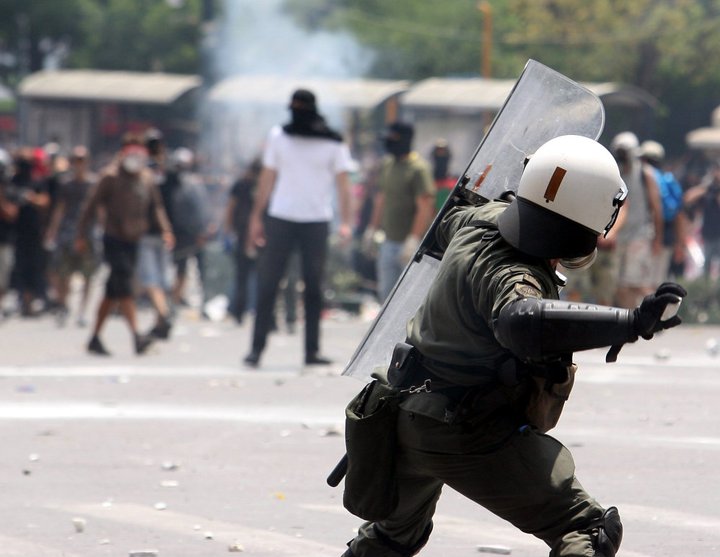
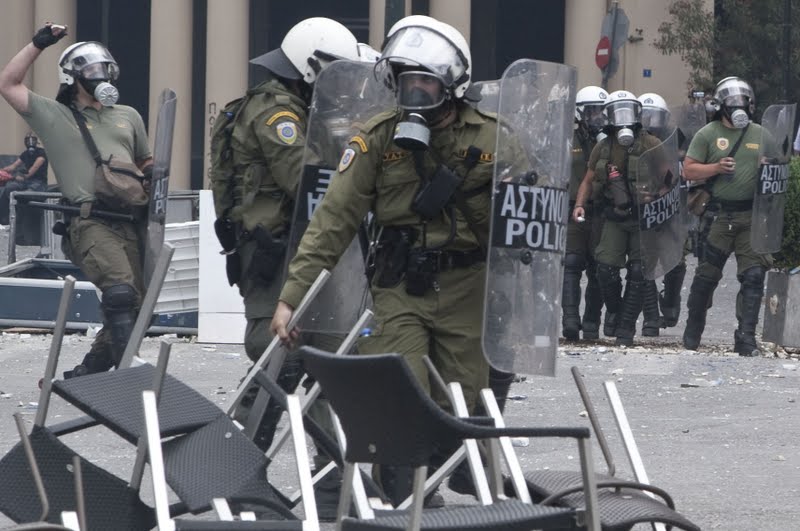
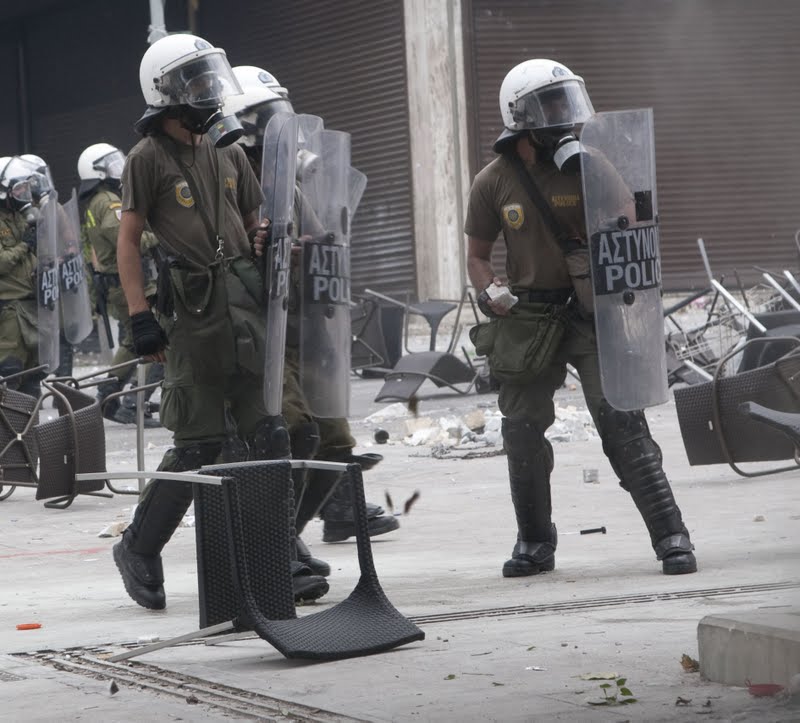
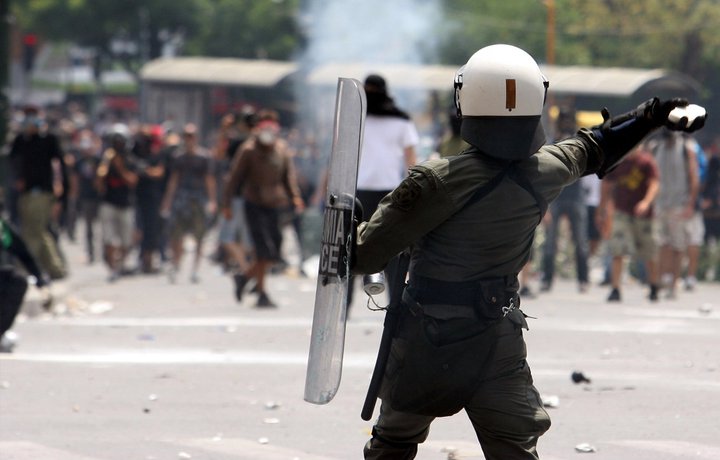
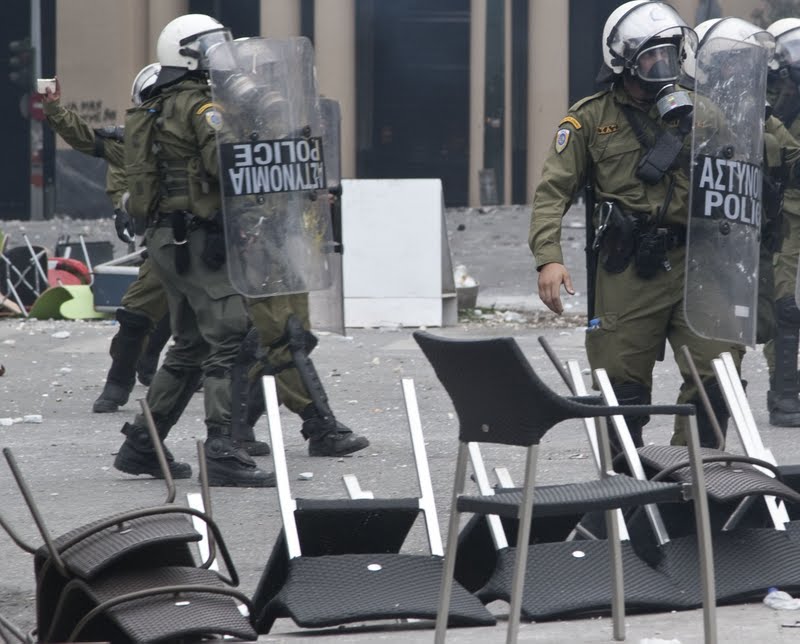
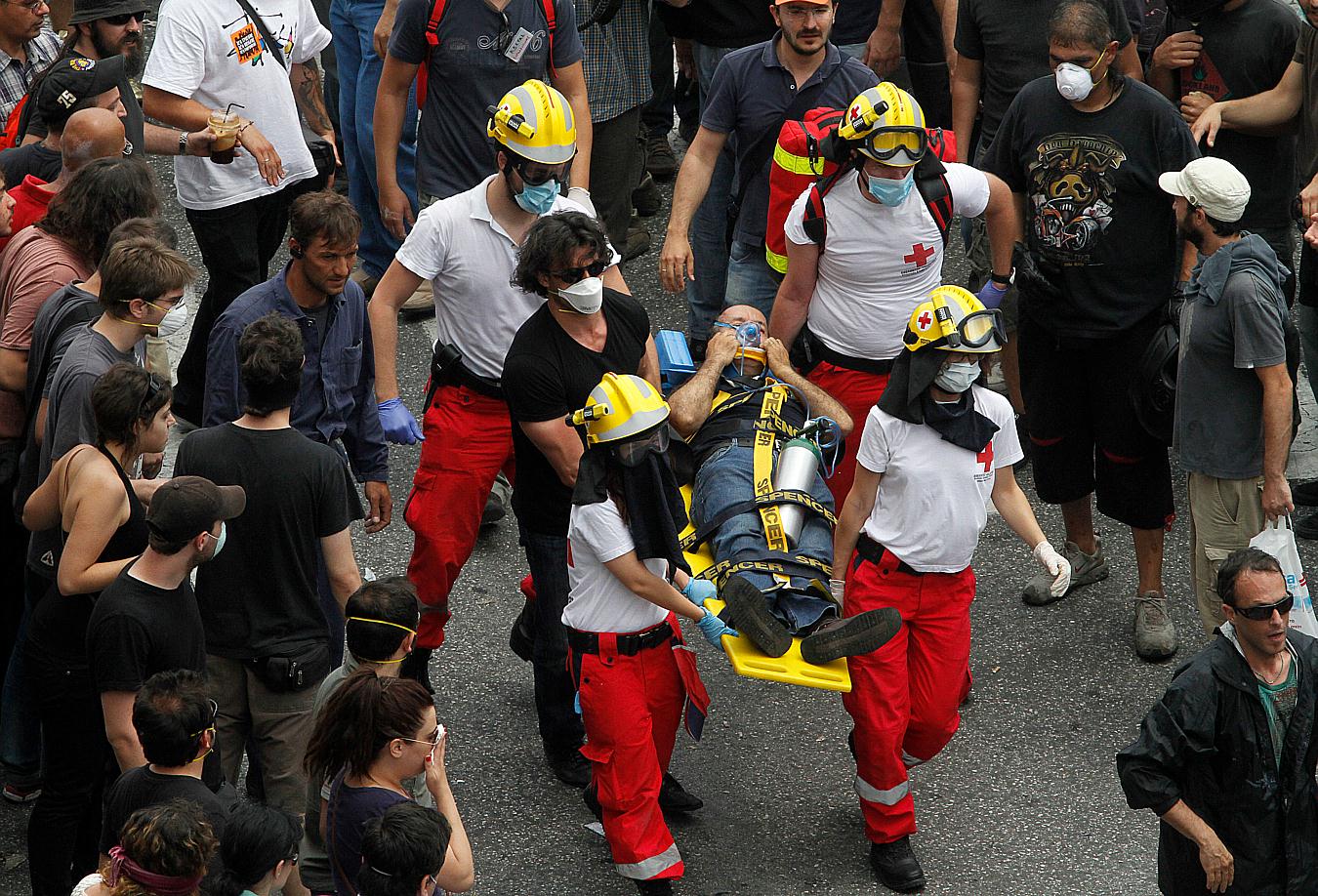
- http://www.telegraph.co.uk/news/picturegalleries/worldnews/8606685/Greek-bailout-crisis-a-second-day-of-violent-protests-in-Athens.html?image=9
- http://www.telegraph.co.uk/news/picturegalleries/worldnews/8606685/Greek-bailout-crisis-a-second-day-of-violent-protests-in-Athens.html?image=10
- http://www.telegraph.co.uk/news/picturegalleries/worldnews/8606685/Greek-bailout-crisis-a-second-day-of-violent-protests-in-Athens.html?image=11
A policeman hits out at a photographer
A demonstrator lies in the road after being struck by police